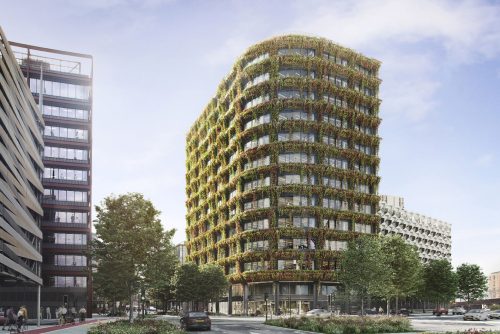Manchester faces ‘retrofit race’ to meet 2030 commercial buildings energy targets

Manchester risks not achieving the Government’s net zero targets, unless significant action is taken to upgrade and improve commercial real estate in the next 10 years, according to new analysis by professional services firm JLL.
A new report, Sustainability and Value in the Regions, concludes that 85% of the office stock in Manchester is at risk of not meeting the Government’s target for all non-domestic properties to have an EPC B rating by 2030.
This is compared with an average of 90% across all of England and Wales’ leading regional centres.
These findings come at a time when Manchester has announced its aim to be net zero by 2038.
The report’s conclusions point to the need for a significant programme of refurbishment and retrofitting, delivered over the next decade, to support the green agenda of the Greater Manchester Combined Authority, as well as the city’s occupiers.
But of the eight regional economic hubs included in JLL’s analysis, Manchester is leading the way, boasting the highest proportion of existing BREEAM Good to Outstanding office stock (17%).
Manchester’s ongoing New Bailey development, by Muse, is also hoping to join this group, targeting Outstanding status on completion in 2023.
JLL’s insights also highlight the need for repurposing to help cities meet their net zero targets.
According to the research, annually five per cent of commercial stock needs to be redeveloped.
In Manchester, replacement rates currently stand at around one per cent. But the city is faring better than other areas, with rates in the South East currently at minus two per cent.
And this number is set to rise as Muse, the Manchester-based developer, is seeking operational net zero carbon verification for its schemes in the city.
The office footprint of Manchester firms with science-based sustainability targets has increased by almost 20 times in the past three years to nearly one million sq ft, ranking it the second largest sustainable occupant portfolio within JLL’s sample.
Stephen Hogg, head of Manchester at JLL, said: “It is fantastic to see the city leading the way in terms of BREEAM ratings, showing a commitment from landlords and occupiers to maintain the highest standards of sustainability.
“But, overall, our research shows a mixed bag for Manchester, with the rate of redevelopment and improvement currently far too slow if we are to make meaningful change and avoid a climate emergency.
“Reassuringly, the report shows that investors are now prioritising the sustainability of their portfolios more than they have done in the past, so we will continue to work in collaboration with them to help them to achieve these goals.
“Manchester now has the opportunity to lead this conversation and set an example for the rest of the country.”
Elaine Rossall, head of UK offices research at JLL, said: “As COP26 has only served to reinforce, the next 10 years are imperative to the future of the planet. The built environment accounts for around 40% of all carbon emissions, but is even higher in many cities, meaning our cities and commercial centres must change, or risk undermining any regional efforts – now set in stone in the carbon frameworks of most major cities – to achieve net zero status in the 2030s.”
She added: “This research indicates just how far short of those targets some regional office markets will be if, in addition to ongoing investment in new low carbon stock, the vast majority of existing offices aren’t improved via refurbishment or retrofit.”
The research analysed the commercial property markets of Thames Valley, Bristol, Cardiff, Birmingham, Manchester, Leeds, Glasgow and Edinburgh. EPC analysis excluded Scottish cities.








